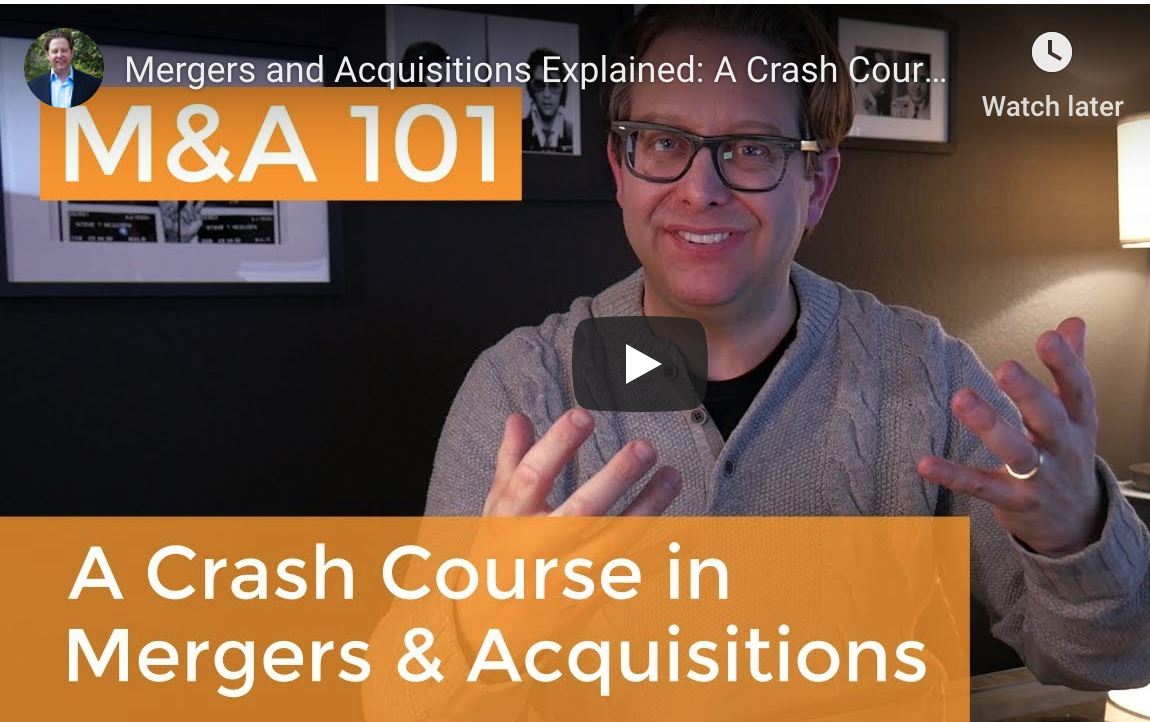How to Choose an M&A Lawyer (to Help You Sell or Buy a Business)
Assembling Your M&A Team: M&A Lawyers
A critical player on your deal team will be your lawyer. Your lawyer and his or her team will work directly for you (or your company) as opposed to working as a neutral intermediary. All lawyers owe their clients fiduciary duties, which means that your lawyer will have your best interests in mind.
M&A attorneys are also called transactional lawyers or deal lawyers. While you can hire a general lawyer to handle your sale, doing so is not recommended, especially for deals of higher dollar amounts. Each deal is unique and has its own complexities, but the larger deals tend to have more moving parts and require a more experienced lawyer to handle the complex tax and legal issues. The higher your likely sale price, the more inclined you ought to be to find a lawyer who specializes in M&A.
Services
M&A lawyers provide a variety of services, including preparing non-disclosure agreements (NDAs or confidentiality agreements), preparing purchase and sale agreements, seller-financing notes, and helping with due diligence. Due diligence is the process of a buyer “kicking the tires” and determining if they want to buy the company—from a legal, financial and commercial perspective. If there are licensing and regulatory issues, the lawyers will generally handle those. Employment and tax considerations also generally fall to the lawyers, although the company’s accountants sometimes handle the latter.
Whereas the brokers or bankers up to the point of selecting a buyer typically quarterback the sale process, after that time the lawyers are generally the lead person. The reason for the switch is because when a buyer is selected the focus becomes getting the deal down on paper. The parties negotiate the documents that will govern the sale. These documents are legal documents. The bankers or brokers may still remain integrally involved, depending on their style and comfort level with the legal docs, but the lawyers will typically steer the ship from here on out.
Compensation
Depending on your style, budget, and appetite for risk, you can expect to pay your M&A lawyer anywhere from a few thousand dollars to $50,000 or more. For deals above the lower middle market ($50 million and above), the legal fees are likely to be well into six figures. If you budget just a few thousand dollars, your lawyer will likely spend his/her time reviewing a purchase agreement prepared by the other side and letting you know the points of major concern. Most of my clients want a little more advice than that. For a deal in the $2 million to $10 million range, a very reasonable budget is between $15,000–$20,000.
Choosing Your M&A Lawyer
You will want to retain the services of a lawyer who has practical experience seeing what does and does not work during the process of merger or acquisition. They should also be familiar with the formal structure of M&A and know where negotiations between two parties often break down in the merger or acquisition process. Being able to distinguish standard industry practices from the relatively non-standard demands of the buyer is also imperative in a lawyer.
Experienced deal lawyers are great negotiators, and they are practical. They won’t allow a small issue to become a huge one. M&A deals move quickly, and they are all unique and carry unique issues. Issues pop up and good deal lawyers know better than to create massive concern over minor matters.
By far, the most important consideration in choosing a lawyer is that he/she has plenty of knowledge and experience with mergers and acquisitions, especially for mergers and acquisitions involving engineering firms or engineering companies. When it comes to M&A, different industries have specific nuances that only an experienced corporate attorney can help avoid or address. If your lawyer has general business experience from life as a non-lawyer, that is a huge plus.
Your lawyer does not necessarily need experience in your exact industry. A mentor of mine used to talk about the prospective client who was selling a chain of donut shops and asked him if he had experience in the industry. My mentor informed the seller that there are no donut shop lawyers, which is true. Specific market experience is not nearly as important as your M&A lawyer having deep experience and knowledge of mergers and acquisitions generally. The sole exception to this rule is highly regulated industries, such as energy and utilities. There you may benefit from a lawyer who has done a few deals in your exact market. Otherwise, you should prioritize experience in M&A over experience in specific industries.
Besides having a lot of M&A experience, choose a lawyer you like and who will work the way you want to work. This is your deal and your deal team—find a lawyer who has your back. You will work closely with your lawyer throughout the M&A process, and because there are lots of lawyers to choose from, focus on finding one you like. It is always recommended that you meet with the lawyer several times as well as engage with them in a more casual environment, like grabbing a few beers. Ask the lawyer questions. Learn about their approach to business. Your lawyer should share your view of the business world and the types of things that matter.
There is no one way to lawyer an M&A deal, so each lawyer will have a different take on how to handle the deal. As I mentioned earlier, it depends on time, industry, budget, style, and your appetite for risk. However, not every lawyer shares that sentiment. Some believe that there are certain set ways of doing things. Some lawyers are happy to take a back seat and let you drive the transaction, coming to them when you need to do so. Others are offended, annoyed, or concerned with that approach and require they be the point person on everything.
Good lawyers should adapt to the client’s style and needs, but this is not an issue of a right and wrong way to do things. There are different ways to handle an M&A deal, and the important thing is for you to find a lawyer that will work the way you want to work. A great lawyer can talk through the major considerations and approaches with you.
For deals in the middle to upper range of the lower middle market ($25 million to $50 million), you should consider engaging a law firm or team of lawyers, as opposed to a solo practitioner. This is not necessarily critical, and there is no clear threshold after which a solo practitioner becomes less practical. Still, larger deals tend to move a little more quickly and certainly have more parts that are moving. Larger companies tend to have more employees, which means more human resources issues. Tax considerations become more significant.
Larger operations mean more issues and considerations, and the higher purchase price means the parties generally expect and justify spending more time on legal fees. Whereas, a concern about misclassification of workers as independent contractors when they are really employees may be a minor issue when there are just a couple workers affected, it’s likely to garner a lot more attention if there are dozens of workers impacted.
Choosing an M&A attorney can be one of the most important decisions of an entire deal. If you are going through a merger, make sure that you keep these tips in consideration when considering which M&A attorney you choose for guidance specific to your situation and deal. If you have questions for an M&A lawyer, reach out to me at 512.888.9860. I have offices in Austin and Houston, although I represent buyers and sellers all over Texas.

